Students to battle for Unicaf essay prize
Unicaf University has organised an essay writing competition for secondary school students in the country.
The participants have been asked to submit their innovative ideas on the themes of information and communications technology (ICT) and entrepreneurship.

The competition is also open to school leavers.
The curators say they want to use the competition to promote creativity and innovation among young people as well as help them realise their potential as entrepreneurs and leaders in critical fields.
According to the organisers, five essays will be selected and the author of the winning essay will receive a 100 percent scholarship at Unicaf University, a tablet and $150.
The runner-up and third-placed will also each get a scholarship at 85 percent, a tablet and $100 while the fourth and fifth-placed will receive $100 each.
Unicaf University senior marketing officer Preston Mkupu in an interview yesterday said participants are required to submit a typed or hand-written 500-word essay that addresses a problem in their community in the fields of ICT and entrepreneurship.
He said: “Essay writing helps in developing critical thinking, language and analytical skills. It helps in understanding the meaning of words and sentences. It helps in enhancing communication and comprehension skills.
“It helps in building confidence for public speaking and delivering of speeches.”
Mkupu further said the institution realised the need to enhance literary skills among learners through free computer lessons and open lectures that they conduct for school leavers.
“We noted some gaps that we felt can be filled with a more detailed and target-driven initiative and this essay writing competition fits that bill,” he said.
The university said a panel of judges will be engaged to review and grade the entries in selecting the winners. Mkupu said the prizes will help the winners further their education and help them in developing their ideas into viable business ventures.
In a separate interview, seasoned writer Alfred Msadala said the reading culture in Malawi is heavily challenged by low provision of right materials. He, therefore, said such writing competitions can help fill that gap.
“The interest is to see the reading culture sustained and improved. Reading is not low in Malawi, but the provision of the right material is still wanting,” he said.
Msadala said literary competitions serve as the right antidote for creativity.
He said: “This is outside the classroom and entrants are determined to prove to the world their capability and at the same time serve purposefully in the cultural fabric of a society.”





